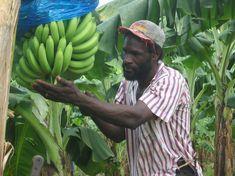
Windward Islands banana exporter Wibdeco is branching out into other produce lines and sources.
Wibdeco md Bernard Cornibert told freshinfo: “Hitherto we have been a single commodity group, trading only in bananas. Although we have diversified our supply base, our business is still exposed to vagaries of the Windward Islands banana production because of its narrow product base. This must now change. We are encouraging the Windward Islands to diversify their agricultural production while, as a business, the Wibdeco Group is seeking to expand its scope in order to grow or increase shareholder value. And so the group has decided to diversify its product range with fresh produce from the Windward Islands and other sources.”
Cornibert added that with this new thrust, it will be necessary to project a different image to market. “The market must be made aware that we are not just a banana company and that message must be communicated effectively through our name, brand and logo,” he said. “That is why we are considering rebranding.”
The industry leader also spoke out strongly on pricing saying Tesco’s move last week to increase its price by 10p a kilo was “sensible” and “a courageous move” but added that with rising increasing costs now was not the time for the multiples to “play games” with the price of a product as significant as bananas. “Bananas are badly under-priced at the current 67p a kilo level,” said Cornibert. “We would like to see the price restored to the 2001 level of £1.08 per kilo. It is the only price that makes commercial sense for the supply chain at today’s costs. The struggling producers, who are facing almost daily increases in input costs, need a price increase. Therefore, I think it is appropriate to appeal to our retail customers to reconsider the treatment of bananas in the ongoing tussle over prices…Banana prices continue to fall for no apparent reason and, as suppliers, we are often expected to support these insidious price reductions. The extent of price deflation in the UK banana trade defies all economic logic, particularly against the backdrop of significant cost inflation. Who really is paying for this deficit or loss?”
And back at source, Wibdeco has been reorganising prices paid to its growers. “We have maintained stable prices to the local industry since 2001 when market prices were much higher and we have not passed on to them successive price reductions that we have suffered in the marketplace between 2001 and now,” said Cornibert. “However, we recognise that, by keeping prices fixed throughout the year we have not been receiving the best production responses from the farmers and so instead we have decided to frontload prices to the first half-year when market conditions are more favourable and when we require larger volumes. Farmers are…better off under the revised arrangement.”



